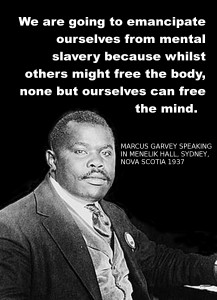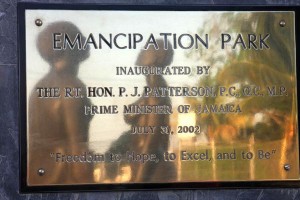
Emancipation Revisited
July 31st, 2017
Emancipation is a difficult word. It’s too long, for a start: five syllables long. When combined with the four syllables of Independence holiday it becomes that horrible portmanteau word someone invented (a Government official, perhaps?) a few years ago… Emancipendence. But I would suggest we could hardly celebrate them both together, in one breath. That would be trivialising the holiday, I believe. Each must stand on its own feet.
It’s twenty years since then Prime Minister P.J. Patterson declared August 1 as Emancipation Day holiday. I honestly don’t recall this being greeted with any great acclaim by the general populace – except perhaps as a nice additional day off, close to Independence. Few of us complain about a new national holiday. Another advantage was that the two holidays could merge as… you know what… thus allowing people to take a good few days off, if possible.
This was a re-introduction of the holiday, in fact. Jamaicans had celebrated it as a public holiday since 1893; it was then abruptly discontinued when Jamaica gained its Independence in 1962. I wonder why? Was it that the brave new Jamaica did not want to commemorate its history of slavery – or at least, wanted to put it on one side as the country strode confidently into the future? No looking back at the painful past? I am not sure. Perhaps a historian can explain what the thinking was behind it.
What does Emancipation mean for Jamaicans today? Can Jamaicans really express what their “freedom” is, twenty years after the holiday was first declared? Apart from discussing Bob Marley’s lyric (actually a Marcus Garvey quote): Emancipate yourself from mental slavery (and the predictable debate that follows), can we take a fresh new look at emancipation instead of wheeling out the same old platitudes in newspaper columns? Perhaps some comprehensive “man/woman/child on the street” interviews might reveal some interesting answers to my questions. They could be a starting point.
In the same speech in Sydney, Nova Scotia (not Australia) in 1937, Garvey also observed:
Mind is your only ruler, sovereign. The man who is not able to develop and use his mind is bound to be the slave of the other man who uses his mind, because man is related to man under all circumstances for good or for ill. If man is not able to protect himself from the other man he should use his mind to good advantage. The fool will always carry the heavy burden.
Please note my italics in the above Garvey quote (actually Marley turned it into an exhortation, whereas Garvey said we are going to, perhaps with more conviction than the singer). I wonder if the self-emancipation is the problematic part of it. Jamaicans (public figures of all kinds, in particular) express varying degrees of patriotism at this time of year. But are Jamaicans hearts really in it? How easy is it to shake off the history of colonial oppression – not the physical chains and denial of human rights, but the “heavy burden” of simply not engaging one’s God-given intelligence that Garvey mentions above? (He elaborates on this in this particular speech, by the way; the word “intelligence” crops up regularly).
The problem is this. Not only did we not emancipate ourselves; we did not make ourselves independent either. We gratefully received these benefits, and celebrated them, having suffered from the evil system of slavery and remained a subject colony for centuries. However, at this juncture in Jamaica’s history, do we feel real pride in our freedom, and subsequently in our independence? I mean, do we feel this pride genuinely and in a very personal way?
I’m not trying to be controversial; and I know these questions have been asked before. It seems to me, however, that Jamaica still has not quite internalised the concept of “emancipation” – it’s an abstract. Perhaps it would be good to turn to the oft-told stories of our National Heroes. They are mere paintings on the walls of primary schools. We need to bring them to life. Can we think about their struggle, as individual Jamaicans, for something they saw as freedom? What was in their hearts and minds?
Perhaps tomorrow is as good a day as any to reflect, turn this five-syllable word over in our own minds and search our own hearts. Let’s come up with some real answers that work for us as 21st century Jamaicans, and put the clichés back on the shelf.
Tags: Emancipation, Emancipation Day, Emancipation Park, Independence, Jamaica, Marcus Garvey, National Heroes, P J Patterson, Prime Minister, slavery
The Gleaner reserves the right not to publish comments that may be deemed libelous, derogatory or indecent.
To respond to The Gleaner please use the feedback form.
2 Responses to “Emancipation Revisited”
- We Are the Zoomers
- Living Online with Humans and Birds: NAOC 2020
- Human Trafficking and the Problem of Public Education
- Down Memory Lane
- Are We Ready to Recover from COVID-19?
- Road Safety Matters: Is Your Vehicle Safe?
- Sexual Harassment, Me Too, and the Minister’s Disturbing Giggle
- The Vulnerable Senior Citizens, Private Care Homes and COVID-19
- A Muddle Over Masks
- Here is Something Life-Saving You Can Do: Give Blood!





I agree with you in your article. Some Jamaican’s feel that emancipation is only associated with slavery and for most slavery is this abstract thing that happened to some black people in the past without having a really connection to our everyday struggle as a people today . Some can not critically analyzed how slavery is connected to their every struggles and oppression. This is a good indicator for the oppressors, because if they have managed to colonized Jamaicans then struggle for liberation might as well be over.
Exactly. You have put your finger on something there! Because quite a few Jamaicans don’t “connect” with the concept of emancipation/freedom on a personal level and cannot translate it into their lives and ACT on it, this enables the post-colonial mindset to perpetuate itself (without the “oppressors” doing anything much, actually).